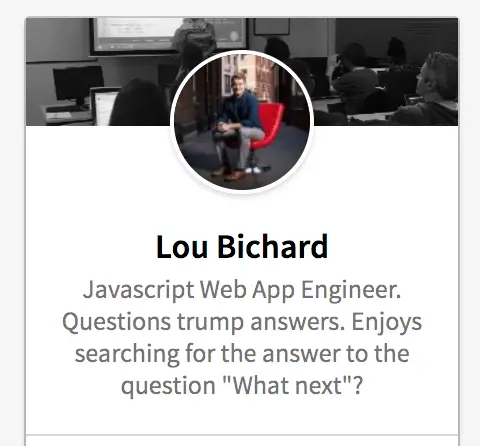By rewriting your concerns as questions you move from anxiety to curiosity.
This is a paraphrased quote from the book Sprint. Author Jake Knapp is talking about gathering a list of “what could go wrongs” on a project as part of a design Sprint. Knapp is tapping into the elephant in the room and testing the worst case scenarios. But rather than listing them as statements, Jake says to list them as questions. “If we don’t get our customer to understand X we’ll fail” becomes “How can we encourage the user to understand X?”.

This is advice that applies not just in a design workshop but also in every other aspect of life. If you flip your concerns, and ask them as questions it taps more into your curiosity. Not only that, but you can ask the question until it becomes a habit. When you have good questions, you don’t need answers. Questions trump answers. I stick by this mantra so much I decided to use it on my LinkedIn header.

Asking good questions is an art. It’s not something that can be taught, it’s something that has to be learned. Through trial and error and practice.
My personal questions
The best way to understand how questions can be used in is to see them in action. The following are a sample of questions that I ask myself weekly.
Most of these are to do with career, but I have other questions for my personal life, too. I’ve also added a bit of text on why I ask these questions as the reasoning might not be immediately obvious. These questions came straight out of my task list, unedited. Every time I revisit this list I have usually forgotten or slipped on one aspect. So most of these form as reminder questions.
I update the list whenever I find another quote or piece of advice that I want to remind myself of. As before, I ensure to flip all quotes into questions. Rather than just storing a quote “Don’t have friends who bring you down” to “How can I spend more time with fulfilling people?”.
Are you relying too much on your company to give you the life you want? Only you can give yourself that.
This doesn’t only apply to employers, but family and friends, too. It’s easy to lean on these people and trust them to always do what’s in our best interest. We get trapped thinking that others should be doing more for us than is reasonable. This is a condition of our education. We all sat in a class and behaved when we were young. The teacher did all the work. But in life, it’s easy to forget that we’re in charge of our own education. I ask this one of myself as there’s a lot I can do outside of work to push further, if I feel that I need it.
People like to see behind the curtain. Are you being candid and honest?
This is somewhat of a writing goal. But it also applies to giving presentations, talks or conversations. I always liked when I read blogs where I saw people’s homes or an insight into their life. I want to embody this in my own writing. So I try my best to pull back the curtain and show the truest rawest reality. See that screenshot from LinkedIn earlier on in the post? That’s the stuff I mean. It adds a bit more humanity to life and it makes our work, and our conversations more human. Being vulnerable and transparent is not a weakness.
Flow and Stock. Are you prolific and are you generating assets?
In content marketing you can look at what you produce as one of two things. Flow, or Stock. Flow is ensuring that you’re prolific. It’s the heartbeat that reminds people you’re still there and you’re still alive. But it doesn’t deliver much substance. Flow is going to MeetUps, commenting online, tweeting, sharing an article or turning up at work. But then the other part of this is Stock. Stock is the big work you do. It’s the assets you create. Writing a big article online, doing a big conference talk, writing a book etc. Sometimes it’s easy to get caught up in the day-to-day of producing without creating Stock.
“Income follows assets” – Daniel Priestley. Are you appropriately focusing on assets?
Purpose: This is another shake up question. It’s easy to focus on income. But income is always traded for time. You can’t scale your own time, so you need assets. We’re all worth more if we can create more value for others. If I answer a question for someone in person, and feel it’s somewhat profound or useful I try my best to then write it up online. That way it is read by a much bigger audience and scales better. It’s also a much healthier mental position to be in, to focus on creating assets, rather than income. Creating assets is as simple as making online content. Your income is a bit more out of your own hands. Make assets, invest in yourself and income will follow.
What questions do you ask yourself to keep yourself on track?
Latest posts by Lou Bichard (see all)
- 2024 Summary: A year of trips and professional work - January 9, 2025
- 2023 Summary: Data Driven Stories About The Cloud - December 31, 2023
- 2022 Summary: The Open Up The Cloud System - January 1, 2023